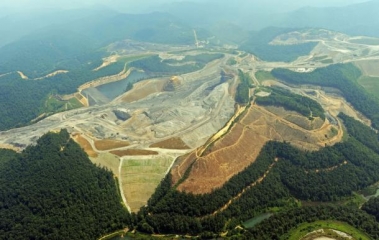John Fraser lifts the lid on the worrying social and environmental impact of our ‘must have’ consumer society.
Pandora’s Box – a metaphor for our time.
Are we mature enough as a society to protect our last remaining wildernesses and ecosystems or, are we to be like Epimetheus and not have the foresight to see the true implications of our actions beyond our primitive desires?
A recently released report by the Gaia Foundation on the extractive industries and all that goes with them brings into clear perspective the scale of destruction and almost frenzied rate of extraction going on with total disregard for populations and the environment.
I would like to give just an outline of this report, a feel for what is happening worldwide, what this means for all of us and how we are all connected in one way or another, whether it happens in the North Sea, the Amazon or Africa and what we could do about it.
It is the sheer scale and rate of extraction which is startling and it is increasing year-on-year. These industries are far bigger than most people realise and are growing. We are now entering a new phase where old deposits are being reworked due to the development of new technologies added to a new scale of demand.
For example, in the last ten years, extraction of iron ore has increased by 180%, Cobalt.165%, Lithium 125% and Coal 44%. Prospecting is also more prevalent which means a massive increase in years to come. Enormous industrial wastelands are created, with the accompanying effects on habitat, water and land pollution. Displacement of population follows.
Human rights, mainly but not exclusively those of indigenous peoples, are being ignored. Environmental laws are broken or circumvented.
To produce one ton of copper, 300 tons of waste is created.
Along with this insatiable hunger for the Earth’s resources comes a great need for water, a resource that in some countries is not plentiful. Even now, SE England is suffering drought.
In Scotland we are in the early stages of fracking which requires 1.8 million gallons of water. To frack nickel requires 377 litres/kg, titanium 100 litres/kg, steel 80 litres/kg, aluminium and copper around 40 litres/kg and to top it all, gold 225,000 litres/kg, giving an indication of how much water is required for this type of industry. The accompanying pollution of each locality is a major problem where waste pollutes the air with particulates and water courses with metal-improving chemicals such as cyanide and mercury.
With all land extraction we find deforestation, destruction of natural water courses, top soil removal and in the USA even mountain top removal, which has been linked to 60,000 cases of cancer according to a Financial Times report. The US Environmental Protection Agency contends that 3.93 billion lbs of toxic chemicals were released into the US environment in 2010, up 16% from 2009, and the mining sector was responsible for 41%.
The volume of minerals which can be recovered from rocks has decreased from the early 1900s, copper from 3% to 0.3%. This leads to more expensive mining and a huge increase in waste materials. To produce one ton of copper, 300 tons of waste is created.
In a 2011 report by Pricewaterhouse Cooper, The Game Has Changed, it is stated that the remaining reserves of most minerals have a lifespan of between twelve years for zinc and 53 years for thermal coal. No doubt new reserves will be found but with more contentious implications such as with offshore mining in Greenland and the Arctic. A huge amount could be recovered by recycling, but this does not solve the problem.
A good start would be for people to know the story behind everything we think we need to have.
Just because most of the extraction happens elsewhere we cannot ignore the fact that indigenous peoples are being displaced from traditional lands by lies and brutality and the earth is being laid bare. These minerals are in the products that we use.
The bridges and roads we build use huge volumes of these resources. All electronic goods are a cocktail of metals and plastic. People in South America, Africa, India and many other parts of the world are asking us for our support to save their lands.
The world is now faced with a huge increase in demand for resources as the populations of China, South America and India all want western lifestyles. This is just not possible. A recent Scottish Government report acknowledges that we would need three planet Earths to achieve it. Yet, here in NE Scotland we want to build 28 miles of dual carriageway and a new ’garden’ is to be created with huge quantities of the world’s resources being used up in the process.
What do we really need? And what do we desire to have? Increasingly we need to ask these questions and find the answers. As a world community it will be forced upon us.
A good start would be for people to know the story behind everything we think we need to have. Where do the minerals in our laptops come from? How much concrete and aluminium is it going to take to build that road, ‘create a new garden’? We might be surprised – and maybe, just maybe, we’ll realise that we don’t need a new iPod, or more roads. We’ve managed up to now and with a positive change of outlook we can manage into the future, beginning to respect the earth and its peoples, and be grateful to do with less.
The full Opening Pandora’s Box report by Phillipe Sibaud is at www.gaiafoundation.org.uk
